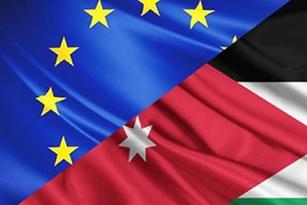- Local News
- Thu-2020-04-23 | 04:26 pm

The proposal comes alongside the "Team Europe” strategy, the EU's "robust and targetted response” to support partner countries' efforts in tackling the coronavirus pandemic. It represents "an important demonstration of the EU's solidarity with these countries at a time of unprecedented crisis”, according to a statement from the commission.
The proposal, following a preliminary assessment of financing needs, provides for 200 million euros of MFA funds to be distributed to Jordan, along with amounts to nine other countries including Albania, Bosnia and Herzegovina, Georgia, Kosovo, Madeconia, Tunisia, Moldova, Montenegro and Ukraine, the statement said.
Valdis Dombrovskis, executive vice president for the commission’s "An Economy that Works for People”, said in the statement: "Supporting our neighbours is essential during this time of crisis to keep the entire region stable.”
"As part of the EU's global response to the coronavirus pandemic, we need to help our neighbouring countries to cushion the worst of its economic impact. These ‘crisis MFA programmes’ will assist 10 countries in ensuring macro-economic stability and protecting their people and companies during the crisis,” he noted.
Paolo Gentiloni, commissioner for economy, said: "European solidarity must not stop at the borders of our Union. Because in this global crisis, we stand or fall together.”
"Today the European Commission is taking a decisive step to help 10 of our neighbours in their fight against the coronavirus. I call on the European Parliament and the Council to swiftly agree to this important package,” he was quoted in the statement as saying.
The MFA funds will be made available for 12 months in the form of loans on "highly favourable terms” to help these countries cover their immediate, urgent financing needs.
Together with the International Monetary Fund's support, the funds can contribute to enhancing macroeconomic stability and creating space to allow resources to be allocated towards protecting citizens and mitigating the coronavirus pandemic's negative socio-economic consequences, according to the statement.
The commission's proposal is subject to adoption by the European Parliament and the Council of the EU.
"Given the urgent need for this support, the commission counts on the cooperation of the co-legislators to ensure the swift adoption of the proposal,” read the statement.
Following the adoption of the proposal, the commission "stands ready” to disburse the first instalment as swiftly as possible after the adoption of the MFA decision and upon the agreement on a Memorandum of Understanding with each partner country.
The second instalment could be disbursed in the fourth quarter of 2020 or in the first half of 2021, provided that the policy measures attached to it have been implemented in a timely manner, according to the statement.
The EU's response follows a "Team Europe” approach, aimed at saving lives by providing quick and targetted support to partners to face the pandemic, the statement said.
It combines resources from the EU, its member states and financial institutions, in particular the European Investment Bank and the European Bank for Reconstruction and Development, to support partner countries and address their short-term financing needs, as well as the longer-term structural impacts on societies and the economy, according to the statement.
The MFA is part of the EU's wider engagement with neighbouring and enlargement countries and is intended as an exceptional EU crisis response instrument. In addition to the MFA, the EU supports the Neighbourhood and Western Balkans through several other instruments, including humanitarian aid, budget support, thematic programmes, technical assistance, blending facilities and guarantees from the European Fund for Sustainable Development to support investment in sectors most affected by the coronavirus pandemic, the statement concluded









